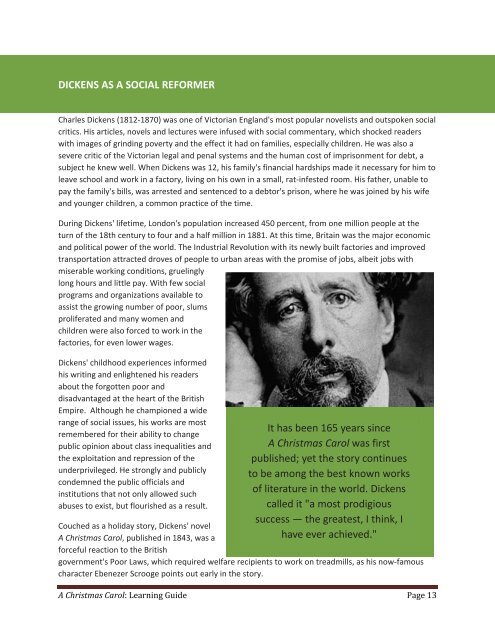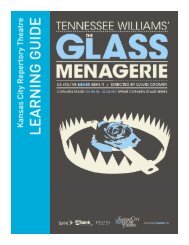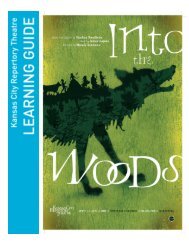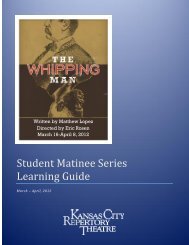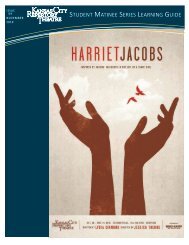A Christmas Carol - The Kansas City Repertory Theatre
A Christmas Carol - The Kansas City Repertory Theatre
A Christmas Carol - The Kansas City Repertory Theatre
Create successful ePaper yourself
Turn your PDF publications into a flip-book with our unique Google optimized e-Paper software.
DICKENS AS A SOCIAL REFORMER<br />
Charles Dickens (1812‐1870) was one of Victorian England's most popular novelists and outspoken social<br />
critics. His articles, novels and lectures were infused with social commentary, which shocked readers<br />
with images of grinding poverty and the effect it had on families, especially children. He was also a<br />
severe critic of the Victorian legal and penal systems and the human cost of imprisonment for debt, a<br />
subject he knew well. When Dickens was 12, his family's financial hardships made it necessary for him to<br />
leave school and work in a factory, living on his own in a small, rat‐infested room. His father, unable to<br />
pay the family's bills, was arrested and sentenced to a debtor's prison, where he was joined by his wife<br />
and younger children, a common practice of the time.<br />
During Dickens' lifetime, London's population increased 450 percent, from one million people at the<br />
turn of the 18th century to four and a half million in 1881. At this time, Britain was the major economic<br />
and political power of the world. <strong>The</strong> Industrial Revolution with its newly built factories and improved<br />
transportation attracted droves of people to urban areas with the promise of jobs, albeit jobs with<br />
miserable working conditions, gruelingly<br />
long hours and little pay. With few social<br />
programs and organizations available to<br />
assist the growing number of poor, slums<br />
proliferated and many women and<br />
children were also forced to work in the<br />
factories, for even lower wages.<br />
Dickens' childhood experiences informed<br />
his writing and enlightened his readers<br />
about the forgotten poor and<br />
disadvantaged at the heart of the British<br />
Empire. Although he championed a wide<br />
range of social issues, his works are most<br />
remembered for their ability to change<br />
public opinion about class inequalities and<br />
the exploitation and repression of the<br />
underprivileged. He strongly and publicly<br />
condemned the public officials and<br />
institutions that not only allowed such<br />
abuses to exist, but flourished as a result.<br />
Couched as a holiday story, Dickens' novel<br />
A <strong>Christmas</strong> <strong>Carol</strong>, published in 1843, was a<br />
forceful reaction to the British<br />
It has been 165 years since<br />
A <strong>Christmas</strong> <strong>Carol</strong> was first<br />
published; yet the story continues<br />
to be among the best known works<br />
of literature in the world. Dickens<br />
called it "a most prodigious<br />
success — the greatest, I think, I<br />
have ever achieved."<br />
government's Poor Laws, which required welfare recipients to work on treadmills, as his now‐famous<br />
character Ebenezer Scrooge points out early in the story.<br />
A <strong>Christmas</strong> <strong>Carol</strong>: Learning Guide Page 13


